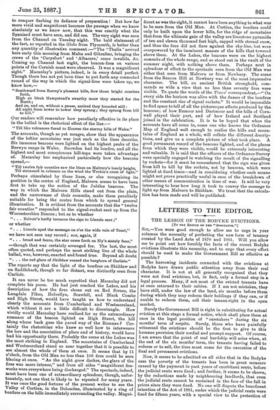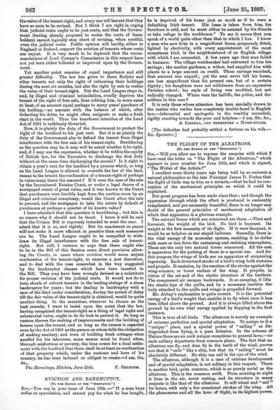LETTERS TO THE EDITOR.
THE LESSON OF THE BODYKE EVICTIONS.
[To Ter EDITOI Or TIM SesoTaTOIL-1 SIII,—Yon were good enough to allow me to urge in your
columns the necessity of perfecting the new form of tenancy created by the Land Acts of 1870 and 1881. Will you allow me to point out how forcibly the facts of the recent Bodyke evictions illustrate this necessity, and to urge that every effort should be used to make the Government Bill as effective its possible ?
The harrowing incidents connected with the evictions at Bodyke have drawn public attention away from their real character. It is not at all generally recognised that they were not final evictions, but, in fact, only a formal step in a legal process. Many, if not most of the evicted tenants have at once retnrned to their cabins. If I am not mistaken, they have still, under the law of the land, six months before them during which they may redeem their holdings if they can, or if unable to redeem them, sell their tenant-right in the open market.
Surely the Government Bill is right in substituting for actual eviction at this stage a formal notice, which shall place them at once in the legal position of " caretakers " during the six months' term of respite. Surely, those who have painfully witnessed the evictions should be the first to give to this humane provision their cordial and prompt support. Of course, I am aware that the point of real hardship will arise when, at the end of the six months' term, the tenants having failed to redeem or to sell, the time must come for the execution of the final and permanent evictions.
Now, it seems to be admitted on all sides that in the Bodyke case the poverty of the tenants has been in great measure caused by the payment in past years of exorbitant rents, before the judicial rents were fixed ; and further, it seems to be shown, by the reductions made by neighbouring landlords, that even the judicial rents cannot be sustained in the face of the fall in prices since they were fixed. No one will dispute the beneficent intention of the Act of 1881, under which the judicial rents were fixed for fifteen years, with a special view to the protection of the value of the tenant-right, and every one will lament that they have so soon to be revised. But I think I am right in urging that judicial rents ought to be just rents, and that the Govern- ment (having already proposed to revise the rents of lease- holders) cannot logically stop short of revising, when needful, even the judicial rents. Public opinion will hardly, either in England or Ireland, support the eviction of tenants whose rents are unjust. It is very much to be deplored that the recom- mendations of Lord Cowper's Commission in this respect have not yet been either followed or improved upon by the Govern- ment.
Yet another point remains of equal importance and still greater difficulty. The law has given to these Bodyke and other tenants not only the right of redeeming their holdings doting the next six months, but also the right by sale to realise the value of their tenant-right. But the Land League steps in, and, by illegal and criminal intimidation, cruelly deprives the tenant of the right of free sale, thus robbing him, in some cases at least, of an amount equal perhaps to many years' purchase of his holding,—an amount with the balance of which, after deducting his debts, he might often emigrate or make a fresh start in the world. Thus the beneficent intention of the Land Act of 1881 is ruthlessly thwarted.
Now, it is plainly the duty of the Government to protect the right of the landlord to his just rent. But it is as plainly the duty of the Government also to defend the tenant from illegal interference with the free sale of his tenant-right. Bewildering as the question may be, it may well be asked whether it be right, and, if I may use the expression, whether it be within the equity of British law, for the Executive to discharge the first duty without at the same time discharging the second ? Is it right to obtain a year's rent for the landlord by a process which, so long aa the Laud League is allowed to override the law of the land, means to the tenant the confiscation of a tenant-right of perhaps in value many times the amount ? If it were the case of the sale by the Incumbered Estates Court, or under a legal decree of a mortgaged estate of great value, and it was known to the Court that purchasers were forcibly kept from the auction-room by an illegal and criminal conspiracy, would the Court allow the sale to proceed, and the mortgagee to take the estate by default of purchasers at perhaps a quarter of its known value ?
I have admitted that this question is bewildering ; but this is no reason why it should not be faced. I know it will be said that the Crimes Bill is expressly intended to meet the case. I admit that it is so, and rightly. But its enactment on paper will not make it more efficient in practice than such measures can be. The Land League ought to be compelled to with- draw its illegal interference with the free sale of tenant- right. But still, I venture to urge that there ought also to be in the Bill of this Session some direct provision allow- ing the Courts, in cases where eviction would mean unjust confiscation of the tenant-right, to exercise a just discretion, and to deal with the case somewhat in the way suggested by the bankruptcy clauses which have been inserted in the Bill. They may have been wrongly devised as a substitute for proper revision of the judicial rents. It would not do to keep shoals of solvent tenants in the leading-strings of a sham bankruptcy for years ; but the dealing in bankruptcy with a ease of the kind under consideration, during the period of delay till the fair value of the tenant-right is obtained, would be quite another thing. In the meantime, whatever be chosen as the beet remedy, I want to insist upon the point that the law, having recognised the tenant-right as a thing of legal right and substantial value, ought to do its best to protect it. So long as custom throws the making of improvements and the building of houses upon the tenant, and so long as the tenant is regarded even by the Act of 1881 as the person on whom falls the obligation of making sanitary, and even of building fresh cottages when needful for his labourers, some means must be found when, through misfortune or poverty, the time comes for a final settle- ment with the landlord that there shall be at least no confiscation of that property which, under the customs and laws of his country, he has been induced or obliged to create.—I RIO, Sir, The Hermitage, .Ffitchin, Tune 20th. F. &swum.



































 Previous page
Previous page